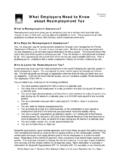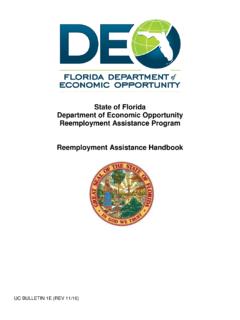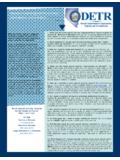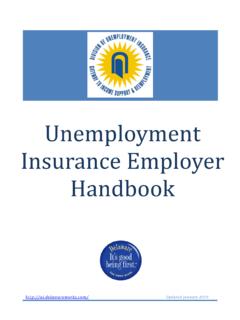Transcription of Background - NVTI
1 1 Background ESGR AND VETS PARTNERSHIP The Secretary of Labor administers and interprets the Uniformed Services Employment and reemployment Rights Act of 1994 (USERRA). The Secretary of Labor also provides assistance to protected persons and investigates complaints brought under the statute. The Secretary has delegated these USERRA duties to the Veterans Employment and Training Service (VETS), an agency within the Department of Labor (DOL). Section 4321 of USERRA provides that the Secretary of Labor (through VETS) will provide assistance to any person concerning his or her USERRA rights. In providing such assistance, the Secretary may request the assistance of other Federal or State agencies and utilize the assistance of volunteers. The primary partner of VETS in providing USERRA assistance for members of the National Guard and Reserve is the Department of Defense (DOD) National Committee for Employer Support of the Guard and Reserve (ESGR).
2 NVTI The National Veterans Training Institute (NVTI) was established in 1986 to further develop and enhance the professional skills of veterans' employment and training service providers throughout the United States. The program is funded by DOL VETS, and administered by Management Concepts, with training conducted in Dallas, Texas and at selected regional sites. The materials contained herein have been designed and created specifically for ESGR and VETS by NVTI. Training Classroom Facility MicroTek-Dallas 5430 Lyndon B Johnson Freeway Three Lincoln Center Tower, Suite 300 Dallas, TX 75240 Phone: For general questions or inquiries, please contact us at Disclaimer DOL VETS and DOD ESGR maintain this server to enhance public access to VETS and ESGR information and programs. This site is updated and revised as needed. The user should be aware that, while every attempt is made to keep information timely and accurate, there will often be a delay between official publication of the materials and their appearance or modification on these pages.
3 Therefore, we make no express or implied guarantees. The information provided does not constitute legal advice. 2 Welcome and Course Overview WELCOME TO USERRA 101 USERRA 101 is a course designed for ESGR Ombudsmen and VETS employees. The purpose of this course is to learn the basics of USERRA law. It is intended for ESGR and VETS staff for knowledge and to receive certification in Basic USERRA 101. We are also inviting other interested individuals to use this site to learn about USERRA and become better informed about this law. They are not required to take the course assessments but we welcome those who wish to do so. NOTE: Complete participation and optimal learning of the USERRA 101 course is best experienced via the e-learning course. As a courtesy, you can download this material as a reference to USERRA and as a training tool. You can use this as a reference to USERRA and as a training tool if you need to facilitate USERRA.
4 COURSE OVERVIEW USERRA is a law which establishes certain rights and benefits for employees, and duties for employers. USERRA affects employment, reemployment , and retention in employment, when employees serve or have served in the uniformed services, and/or take action to enforce, assist with, testify about, or exercise a right under USERRA. This course is set up in simulation style, using service members and/or employers in a variety of USERRA situations, while helping the service member make the best decision and communicate the law to the employer. You will meet your client via a scenario situation. 3 Table of Contents Background 1 ESGR and VETS Partnership 1 NVTI 1 Disclaimer 1 Welcome and Course Overview 2 Welcome to USERRA 101 2 Course Overview 2 Table of Contents 3 Discrimination in Hiring 4 Advance Notice 7 Termination of Employment 10 reemployment Rights 13 Employment Benefits 18 Resources 22 Quiz 22 4 Discrimination in Hiring Introduction: James is the top candidate for a position in which he has been interviewing.
5 In this assignment you will learn that James feels discriminated against by the employer because of the employer s concern about James military commitment. Your goal is to help James make the best decisions and help him communicate USERRA information to the employer. James: I went on my third interview with a warehouse management company. I m going for the shift supervisor s job. And after all these interviews they offered me the job. But at this acceptance interview the employer informed me that with this position, I m required to work every single Saturday and he asks me if this is going to be a conflict. I ve been in the reserves now for two years and I have weekend drill once a month. Yes, this will absolutely present a conflict. But it s a great job offer. I don t want to lose this opportunity for this job. I don t know if I should tell them now or just take the job and wait until it comes up.
6 I just don t know what my best option is for letting the employer know. He s going to be upset after all these interviews. With the job offer being made James must decide what to tell the employer about his reserve commitment. James is faced with two options: Option One: Accept the job offer and don t mention the conflict presented by the reserve duty. Deal with it when it comes up. If James accepts the job and does not inform the employer of his weekend drill, and his reserve duty becomes a conflict, he could be fired for being dishonest in the interview. James has made a poor decision. Option Two: Be honest with the employer and inform him about his reserve commitment. Good choice! The best decision for the service member is to be honest with the employer. This way there are no surprises when a drill or other reserve commitment comes up. If James misleads or lies to the employer, it could result in his termination.
7 This situation may be uncomfortable, but informing the employer up front and keeping an open line of communication is the safest and best way to respond to this situation. Chances are if an employer is informed early about the reserve commitment, under normal circumstances the employer will be willing to work around it. James: I did what I thought was the right thing. I was honest with the employer about my reserve commitments, but I didn t get the final job offer. They didn t offer it to me. So what happened? This is where it gets sticky. The employer s decision could be based on one of the following factors. 5 Option One: James was not hired because of his drill commitment. If James was NOT HIRED specifically because of his drill commitment, this is a direct violation of USERRA under the discrimination provision. James should look at pursuing his USERRA rights at this time.
8 Option Two: James was not hired because another candidate was more qualified. As a general matter, an employer may hire the most qualified candidate for a position. However, in this case, this could be difficult for the employer to prove, especially since James was on his third interview, the acceptance interview. Option Three: James was not hired for unspecified reasons. If the service member s commitment was not brought up as a reason for not hiring, this can be a difficult case to prove. Any one of these scenarios is cause for USERRA assistance or an investigation. There are several options. James can pursue to attempt to resolve this possible employer discrimination. Which is the best for James? Option One: Talk to the employer himself. If James knows his rights and the location of accessible USERRA information, he could discuss the situation with the employer face to face, in a professional manner to determine why he was not hired.
9 If James does find out that his rights were indeed violated, he could inform the employer of the law. In many cases it may be a miscommunication or lack of understanding of the law. The employer might at this point change the hiring decision and follow the law. However, if someone was hired into the position he was seeking due to his military commitment, and the employer is unwilling to change the hiring decision, James most likely does have the law on his side. But it could be a difficult case to undertake on his own. Option Two: Contact an ESGR Ombudsman to represent him. If James is uncomfortable with, or intimidated by, the employer, or not knowledgeable in the law, he could have an ESGR representative contact the employer to handle the situation for him. This is probably the best route since the ESGR representative knows the USERRA law better than James and could articulate it to the employer.
10 The ombudsman would have to look into the timing of the offer, the revealing of the reserve commitment, and the timing of the removal of the job offer. In many cases, the employer just does not understand the law and will cooperate once presented with the provisions of the law. For information on USERRA issues, service members can contact an ESGR Committee representative or call (800) 336-4590 and ask for Ombudsman Services for help. 6 A possible discrimination issue that cannot be easily resolved by an Ombudsman can be referred to VETS, which will begin an investigation upon receipt of a completed 1010 complaint form. The investigation would include reviewing the employer s hiring procedures, job descriptions, all other candidate applications, and interview information. The investigator may need to speak to the interviewers and get all documentation concerning previous job interviews.



